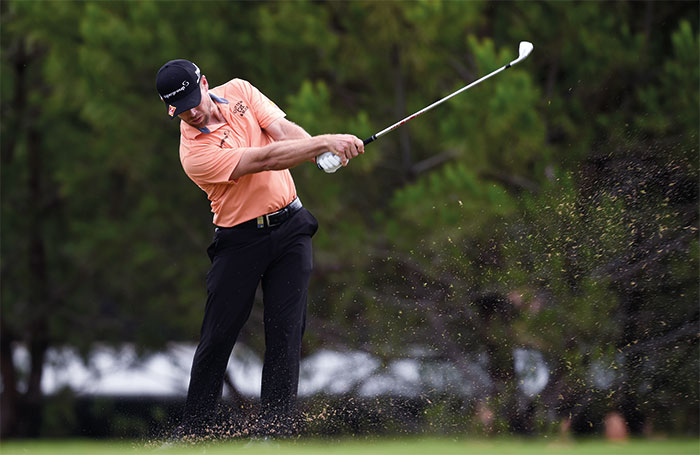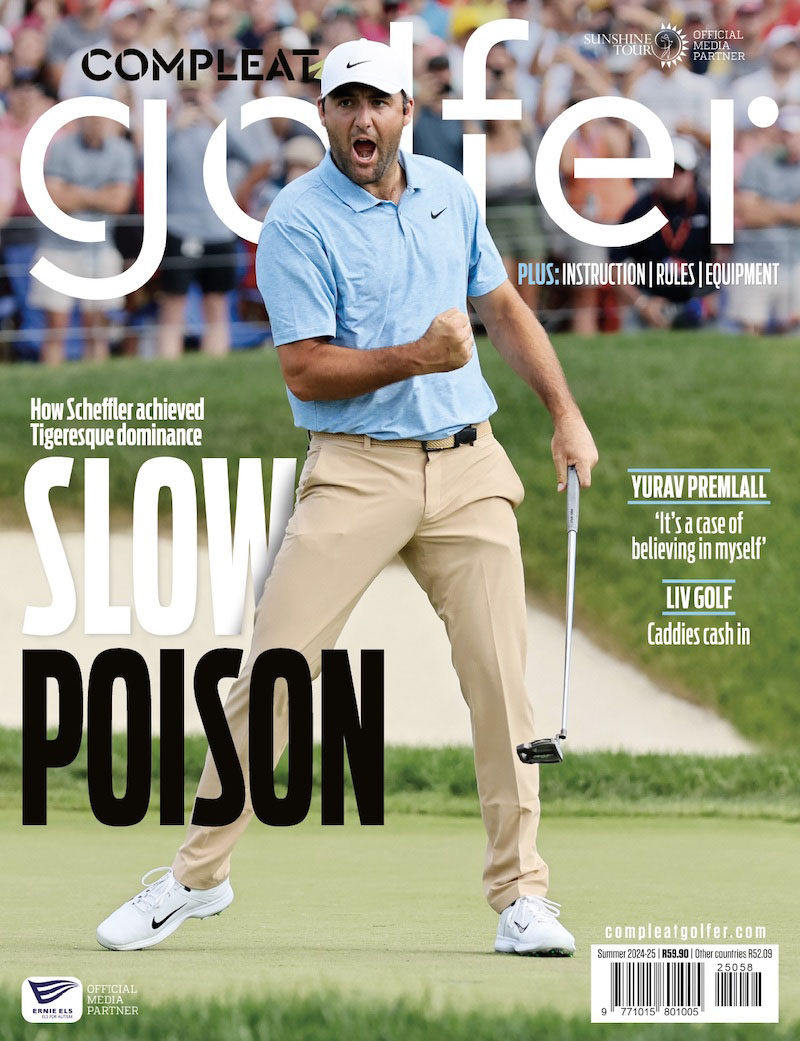Trevor Fisher Jnr spent painstaking years waiting to break onto the European Tour until his victory at the Africa Open in 2015 set him up for a two-year stint abroad. One year into his tenure the 33-year-old has learned what it takes out there.
‘The crowds, even the grandstands, are completely different … the entire atmosphere at big tournaments is totally different. At the Abu Dhabi HSBC Championship I think they had 40 000 people through the gate, and when you start playing well the pressure is definitely there,’ Fisher said.
Nine Sunshine Tour victories in 13 years and six seasons ranked ninth or better on the local Order of Merit make Fisher one of the most accomplished golfers to graduate from South Africa. This year he’s showing that same form overseas, beginning 2016 by making five cuts in a row.
It takes time to adjust when playing on the international stage and Fisher admitted that it was daunting to play among the top golfers of his generation.
‘You’re competing against the best in the world, guys who’ve won five Majors, so there is extra pressure and you have to perform. That’s easier said than done, but if you play well in one week then everything can change for you. Yes, there is a lot of pressure, but you have to deal with it, because it’s part of the job.
‘The goal is to consistently put ourselves up there and have a chance to win, so you have to disregard who else you’re playing with. I want to be in that position every week,’ he said.
In late January Fisher shot rounds of 69 and 70 to reach the weekend of the Abu Dhabi HSBC Golf Championship in contention. He then carded solid rounds of 70, 71 to finish in a share of 16th, tied with Martin Kaymer and three shots behind Jordan Spieth and Branden Grace. Rickie Fowler claimed the victory, while Rory McIlroy and Stenson shared third.
A fortnight later Fisher would put his name into the hat at the Omega Dubai Desert Classic, where he reached the weekend on nine-under-par. He struggled to maintain the pace over his next two rounds, but still took home a share of 26th place.
Adapting to the travel and lifestyle has been tough for the South African, who broke onto the European Tour in March last year. While most players dream of being the next Tiger Woods, Fisher has a completely different take. ‘I don’t want anything to faze me and if I play well I just pat myself on the back. I don’t want to define myself through my golf – whether I play good or bad, I must still be Trevor Fisher. That’s the goal.’
Success in Europe carries a mental gravity and in 2015 Fisher sought greater heights on the back of his co-sanctioned victory. He made 19 cuts in 24 starts that year, but failed to dominate leaderboards the way he had in South Africa.
A year of learning has galvanised his desire to do well in 2016 and so far, so good. His stroke average of 70.45 this season is nearly half a shot better than his 70.84 average in 2015.
‘The standard of play is much higher on the European Tour, and there are different courses with lots of types of grasses. You have to adapt each week, but I’m enjoying the challenge,’ he said.
Fisher began the season with a promising share of eighth at the BMW South African Open Championship, where he flew into contention with a moving-day round of 66 at Glendower Golf Club. He followed that top-10 start with a solid performance at the Joburg Open, shooting no worse than 70 in his four rounds to share 13th place.
Although he missed five cuts throughout 2015, Fisher ended the Race to Dubai in 63rd place, only three spots outside the lucrative top 60. That season has taught him to contend when his game is not everything it should be. During this year’s Desert Swing he claims to not be playing at his best, but his worse result thus far was a share of 48th at the Commercial Bank Qatar Masters, where he shot 76 in torrid final-round conditions.
‘To get those results when I’m not playing well is big. You learn all the time out here and I’ve worked out how to do well even when I’m not playing my best. I have to fight harder when things get tough and play with what I have,’ he said.
Breaking into Europe was not easy for Fisher, who missed his card by two shots at Qualifying School in 2012. Two months later he took heart after being voted 2012 Sunshine Tour Player of the Year by his peers and Golf Writers’ Player of the Year in the same sitting, having won three Sunshine Tour events and finished fourth on the Order of Merit.
The Modderfontein Golf Club member knows how to win tournaments and ranks 26th on the list of golfers with the most Sunshine Tour wins, tied with Retief Goosen and two titles ahead of Charl Schwartzel and Louis Oosthuizen. A self-proclaimed ‘late bloomer,’ he had all the makings of greatness early in his career and won in his first full year on the Sunshine Tour, capturing the FNB Botswana Classic.
Fisher’s first taste of big-tournament contention was at the 2009 Telkom PGA Championship, where he shared second place with Graeme DeLaet, one shot behind winner Jaco van Zyl.
So began a stint of near-misses for Fisher, who came agonisingly close to a maiden European Tour victory at the Joburg Open in 2013. He led after 54 holes, but tailspun in the final round while trying to keep pace with Richard Sterne. Fisher came third, but his determination remained.
‘I need to get to the next level now. My career has been good for me in terms of the stepping stones I’ve taken in the last 10 years. But I’ve stepped on a lot of stones – I need to get to the top now,’ he said that week in 2013.
He was no stranger to heartbreak at that stage, having previously tied the lead going into the final round of the 2010 Africa Open, before finishing in a share of fourth place. In 2011 he tied for sixth at the South African Open Championship and then third at the Joburg Open in 2012.
Fisher would make the weekend in contention and then fall away at co-sanctioned tournaments, all the while struggling to get over the finish line. Simon Dyson played with him at the Dimension Data Pro-Am in 2013 and said, ‘I can’t believe he’s not on the European Tour, the shots he was hitting and the way he managed himself on the course, he should definitely be out there every week.’
It was a sign of things to come, but Fisher needed time to grow. By the time 2014 came around he was a regular contender at big events and that year he came 12th at the Dimension Data Pro-am and 10th at the Tshwane Open on his way to a ‘life-changing’ victory at the Investec Cup. Later that year he shared fourth at the 2014 Alfred Dunhill Championship, which he followed up with a share of 15th at the SA Open.
It finally came together at the Africa Open in 2015, where he produced a stellar performance throughout the week. With his win there was little to stop him from rising to greatness, but he progressed at his own pace and during the 2015 Race to Dubai took only two more top-20s, one of them a third-place finish at the Portugal Masters.
‘I played for 12 years on the local tour, so I know what it means to be out here now. Sometimes I get a bit quick out here, and I have to remind myself to slow it down and play my game. It’s a new experience and you’ve got to handle yourself well and always strive to be better.’
He has also adjusted to international travel and cuisine, time zone differences, and culture shocks.
‘Most of the places we go to are pretty standard, but some of the spots are very different. In China you eat bread and noodles, because you don’t know how they cook things over there; you just stick to the basics with your food,’ he said.
Fisher has a habit of changing putters on a regular basis, and when ‘one gets naughty’ he gives it a break and selects a different flat stick. He recently went back to the Odyssey putter that he used in winning the Africa Open, and the results have followed.
‘Using the old putter has brought back memories for me, so I need to keep that rhythm and see what happens. That’s just the way it is for me. If I feel uncomfortable I change putters. Sometimes I go to a golf course with four putters in my boot.’
The courses on the European Tour rotation will test every aspect of a player’s game, and knowing when to take your chances cannot be taught, but must be experienced.
‘There really is a mix of holes out here. Some are incredibly long, but others are short and really tough to play. And there’s always a choice on how to play a hole and they often have some sneaky risk and reward element. You have to decide where you need to make pars and where you want to try to score,’ he said.
Fisher is a family man, which makes international travel a heavy burden. He plans well in advance to make sure that fatigue and emotional strain are not an issue.
‘I learned a lot about managing my travel last year and hopefully it puts me in good stead. The schedule is a little bit different this year, so there will be a lot of up and down travelling – east to west and north to south – so I’ll try to do three weeks on and off,’ he said.
‘It’s tough to spend weeks out there, but some people like to be away and then come back. I’m missing the family, which is quite tough, but it’s our job. It’s expensive to play at these sorts of big events, so there is more pressure to make the cut. But if you play well there is the chance to make big cheques,’ he added.








